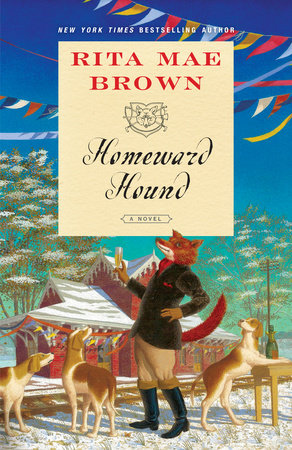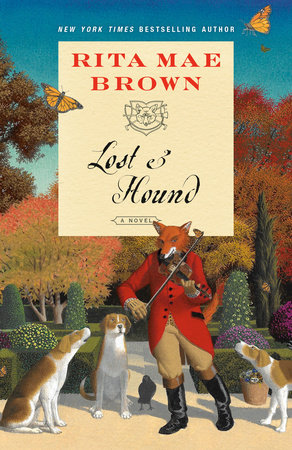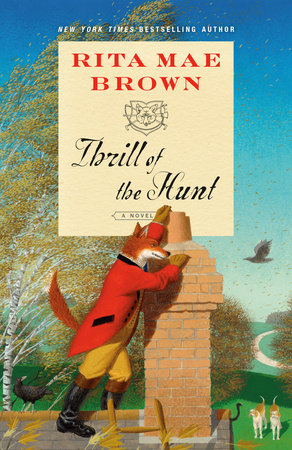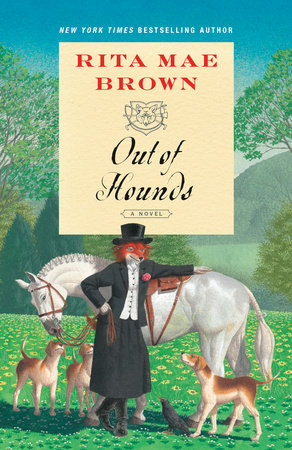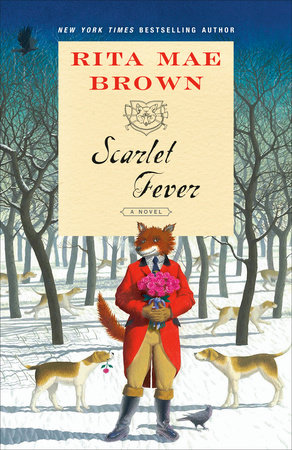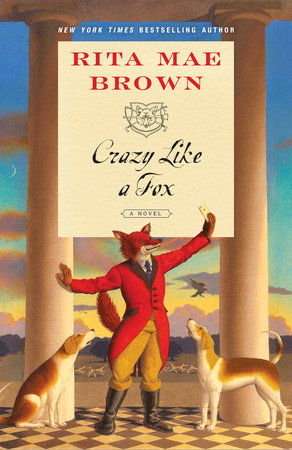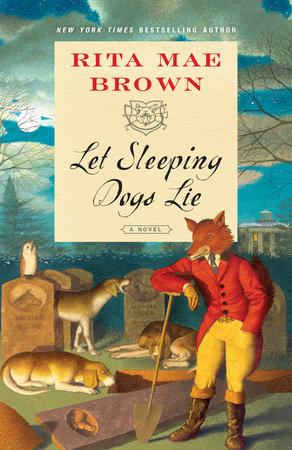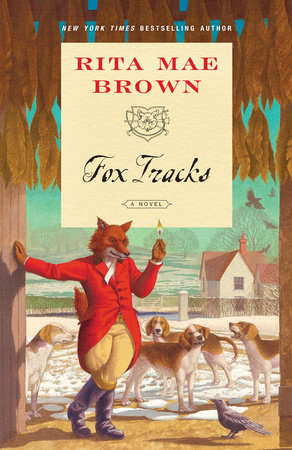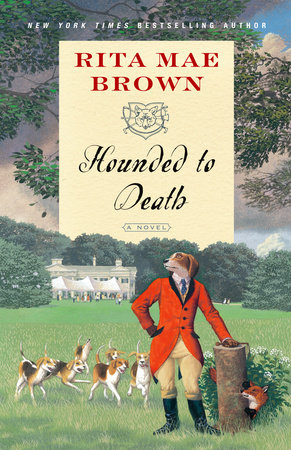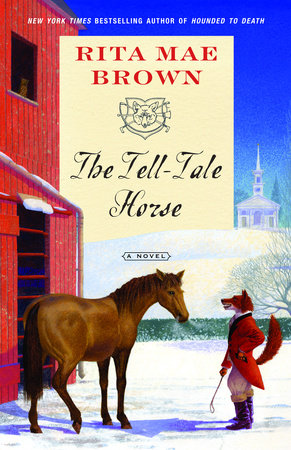Excerpt
Homeward Hound
CHAPTER 1
“Ouch, dammit.” Sister Jane stepped down from the small stool. “Sorry.” She patted Aztec’s neck, her chestnut gelding.
“I thought you were apologizing to us.” Betty Franklin, also braiding her horse, Outlaw, leaned over his neck to look at her friend and master.
Sister Jane Arnold was master of The Jefferson Hunt, had been for over forty years. She loved being a master, making decisions, solving problems. She did not love braiding, however.
“I can do that for you.” Tootie Harris, early twenties, a whipper-in, offered.
“I know you can, Angel, but I think I should braid my own horse.”
“Arthritis.” Her huntsman, Shaker Crown, braiding his horse, teased her. “I’m starting to get it. Anyway, I thought this is what children are for, braiding.”
“You know, he has a point.” Betty was standing on her low stool to reach the mane, a small bit of thick mane between her fingers, the clipped yarn in her mouth, which she took out to speak.
“Think it will be a lot of people tomorrow?” Weevil, the new, gorgeous, male whipper-in, hailing from Canada, asked.
“Weevil, usually is.” Sister climbed back up on the stool. “Matador is standing nicely for you.”
“He’s a good boy with a silky mane. Makes it easy,” the handsome blond replied.
“Just think, everyone who will hunt tomorrow is doing as we’re doing. I like to think of that, all of us trying to make our horses beautiful for Christmas Hunt,” Betty said.
The large end stable doors opened, Sam Lorillard with Rory Boone came in, shutting the doors behind them.
Sam pulled off his lumberjack cap. “Cold out there. Got off work early.”
“Cold enough in here.” Shaker tugged at Showboat’s mane with a short metal comb.
“We’re here to polish the tack. If you all are determined to braid your horses, we might as well get working on the tack.”
“The only reason you two are doing the tack, and there’s a mess of it, is it’s warmer in the tack room,” Betty good-naturedly said.
Sam, the brother of Sister’s gentleman friend, grinned. “That’s why we’re doing it.”
The two men, friends from their days spent living under the downtown bridge by the train station, stripped off their coats, walked into the paneled tack room. Both men had endured detox and counseling, although at different times. Neither of them could get a good job once clean because too many people remembered their misdeeds when drunk. Both wound up working for Crawford Howard, a man with an outlaw pack of hounds. As he hailed from Indiana, he took a chance on them and both Sam and Rory were grateful. Crawford and Sister, often crossways with each other, declared a truce thanks to Sam’s steady work and putting in a good word for Sister. Sam and Gray, his brother, had known the tall, slender woman most of their lives. She and her late husband would give them horses to ride as kids. Sam, younger, went to Harvard. Gray, a few years older, in his middle sixties now, had received a full scholarship to the Darden School of Business at the University of Virginia and from thence to a large accounting firm in D.C. where he rose to partner. Gray, one of the first African American men to reach such power in our nation’s capitol, wore it lightly. The Lorillards were bright people, as was their aunt Daniella Laprade, often married, each husband richer than the last. God knows, in her nineties she might do it again.
Tootie ducked into the tack room for a moment. “Sam, go light on the oil.”
“Will do.” He smiled at the beautiful young woman, almost a carbon copy of her knockout mother.
Tootie returned to Iota, her horse.
“Master, thank you again for loaning me Matador.” Weevil, finishing the braiding, picked up the stool, placing it alongside the stall. “He’s got so much scope.”
He used the term meaning “the horse could jump both high and wide,” much desired in the hunt field.
“It’s good for him to be ridden,” Sister replied. “I only hunt him about once every two weeks. That will change next season because I really must retire Lafayette.”
The gray Thoroughbred, in his stall, shouted, “I am not retiring. I can still outrun any horse on this farm. Just forget the retirement crap.”
Raleigh, a Doberman, and Rooster, a harrier, Sister’s house dogs, both stretched out on benches, tormented the older horse. “Retire. Eat apples and carrots all day. Hey, maybe you can take up golf.” Raleigh bedeviled him.
“Horses don’t play golf, idiot,” Lafayette answered quickly.
“I know that,” the sleek Doberman, wearing his blue jacket, fired back. “You can escape and run all over the golf course. Think of the newspaper coverage.”
Rooster joined in. “Loose horse destroys greens, tears up Ninth Hole.”
“Claims he was chasing a fox,” Raleigh added.
Lafayette snorted. “Better that than dog poop.”
Before this could further develop, Sister’s cellphone rang. She stepped down, punched the icon, walked into the tack room.
“You’re going in there to get warm,” Betty called after her, “leaving us out here to freeze.”
“Ronnie? What’s up?” she asked the hunt club’s treasurer on the line. Although a lawyer, Ronnie liked being treasurer, though he had Gray’s help when needed.
“Forgive me, last minute but I’d like to bring a guest from Deep Run.”
She dropped into a director’s chair while Sam and Rory dismantled a bridle each to completely clean it and shine the bit. No shortcuts.
“Of course, you know I love Deep Run.” She did, too, as Deep Run was the grand and glamorous hunt outside Richmond. “Anyone I know?”
“I don’t think so. Gregory Luckham. I’m lending him Pokerface.” He named one of his horses.
Sister sat up a little straighter. “The Gregory Luckham?”
Now both Sam and Rory turned to look at her.
“Yes, we worked together in Richmond, both of us on the Side by Side fundraiser. I found out he hunted. Would you like to join us for dinner at Farmington Country Club?”
“Thank you, Ronnie, no. You know how crazy it gets before one of the big hunts but of course, he is welcome. I look forward to meeting him. Before I forget, Betty and Tootie talked me into braiding with red and green yarn for Christmas. You know I’m not much for that kind of thing but they told me I was an old fart. To my face. Well, Betty, not Tootie, so I relented.”
Ronnie, one of Sister’s late son’s best friends, stifled a laugh. “You are always correct and I try to live up to your standards, but a little bit of Christmas cheer isn’t too much a violation of tradition. Good decision.”
“You really think so?”
“Sister, you always make the right decision. Which reminds me. Have you looked at the Weather Channel?”
“The snowstorm?”
“They’re predicting it for tomorrow afternoon.”
“I saw that, too, so I figure we’ll hunt for two hours, two and a half, then turn back. I spoke to Kasmir about it and we both decided to move the Christmas breakfast to Boxing Day. This way people can get home ahead of the storm. You know how weathermen dramatize any hint of trouble, so this should calm the nervous.”
“Good plan. You were smart to send the email early.”
“Ronnie, instant communication means everyone wants a decision pronto. How do I know what will happen tomorrow? The Weather Channel predicts a giant snowflake will fall upon Albemarle County. Everyone panics. I like to think things through and one thing I know I can’t think through is the weather. Have you ever noticed how wrong those forecasts usually are?”
He laughed. “I have, but still you were smart. And as I said, you always make the right decision.”
She hung up the phone feeling a bit elated.
Sam, rubbing down a rein, said, “The president of Soliden, the big energy company? Gregory Luckham?”
“Yes.” She stood up, slipping the phone in her jeans back pocket. “Why?”
Rory answered. “He’s a brave man coming here, the outrage over the pipeline.”
Sam filled in. “I don’t think anyone will do something stupid at the hunt but you never know. People are really passionate about this, cutting trees, violating a national park, harming the environment. And one of the projected paths dips right over the Blue Ridge, tears up Old Paradise, goes across Tattenhall Station straight through Beveridge Hundred. It’s lethal.” He named beautiful Hunt Club fixtures.
Rory provided the other side. “Jobs. Lots of jobs. Everything is shareholder value. Soliden doesn’t care what is ruined, what animals harmed.”
“Obviously I’m against the destruction, but I can’t believe someone would make a fuss at Christmas Hunt.” Sister wondered why so many people were so passive about such things.
“Outsiders?” Sam raised his eyebrows.
“Sam, I truly doubt that Gregory Luckham is advertising that he is coming to Jefferson Hunt’s Christmas Hunt.” Sister paused. “At least, I hope he’s not advertising.”
Back in the aisle she mentioned Ronnie’s call and heard the same concerns she’d just heard in the tack room.
“Everything will be fine. Come on, it’s Christmas.” She smiled, climbing back up on the low stepladder. “I don’t remember finishing the braids. They’re so tight.”
No one said a word.
Weevil had finished her braids while she was in the tack room. Took him no time at all.
She led Aztec back into his stall, arranged his good rug on him, walked out sliding the door behind her.
“I don’t know which one of you finished my job but I do thank you. My fingers aren’t what they once were.”
Shaker smiled. “Ah, but Boss, you can still outride any of us.”
She laughed. “Now that is a lie. I keep up. And, in truth, I love it. I’m most alive on a horse. Aren’t you all?”
They agreed.
Weevil, who was learning to love her, lifted an eyebrow. “Christmas. The birth of our dear Lord.” They stopped to look at him. “I believe if Jesus lived here he would be a foxhunter. Scenting is no good in Galilee. But Jesus was a sportsman. He was a fisherman.”
They laughed, happy in one another’s company. Weevil reminded Sister of her late son, RayRay, Raymond, who died in a farming accident at fourteen in 1974. Weevil possessed Ray’s quick way with words, his sense of humor, his love of hounds and hunting. You go on. No matter what happens you go on. She knew despite all, she was a lucky woman. Her husband, Big Ray, was also gone. Ray’s boyhood friends, in their fifties now, stayed close to her. And she didn’t care if it sounded like wish fulfillment, she could feel her husband’s love and her son’s love. She never stopped loving them and would love them until the day she died. She could even feel horses, hounds, house dogs, and cats who loved her.
As she swept her eyes on the people in the barn, she thought to herself, Love is all that matters. It’s so simple. Why do people make life so hard?
Betty interrupted this reverie. “You’re wearing garters tomorrow, aren’t you?”
“Of course. Why are you asking me?”
“So I’ll wear mine. They cut.” Betty complained.
“Then put moleskin under your breeches, twit.” Sister teased her.
“That’s a good idea.” Weevil found garters to rub, too.
Sister tapped her head. “You’d be surprised what’s up there.” Then she thought to herself, Amor Vincit Omnia. Bless Ovid. Love conquers all.
CHAPTER 2
Festooned, a huge, perfect Christmas tree commanded the anteroom before the formal dining room. Christmas balls from the 1920s, glittering new balls, angels, all testified to the longevity of Farmington Country Club, plus why throw holiday decorations away? This redbrick Georgian structure, a hint of Palladio, had been designed by Thomas Jefferson as a private residence before politics overtook his life. Like so many old houses, places, it survived tumultuous times, some up, many down, only to fall into the hands of a few who wished to save it. No one could imagine living there as a family, it was simply too enormous, having been built when one housed one’s immediate family, often one’s in-laws plus every shirttail cousin within a hundred-mile radius. Housing for slaves needed to stand the test of time and they did. Farmington was built to last. The way to save it was to turn it into a country club, which was done in 1927.
Naturally, many were shocked—a commercial venture, how crude. Those many, however, didn’t really have two nickels to rub together, much less what it would take to preserve this elegant place. And so Farmington Country Club inched Albemarle County a bit further toward the New South, which, of course, remained the Old South in ways both laudable and detestable.
The club flourished thanks in no small part to a fabulous golf course, expanded over the decades. The old course, built before land became outrageously expensive, could boast par fives, par fours, and this course did that. The shrubs, old trees, exquisite plantings made golfing as much a joy as possible, although clubs still landed in the ponds.
The formal dining room, painted in eighteenth-century subdued colors, remained a steadfast glory, and it was in this glory that a few Jefferson Hunt members gathered before tomorrow’s Christmas Hunt.
Ronnie had called together people to meet Gregory Luckham. Dewey Milford, ever at nonprofit fundraisers, was acquainted with Luckham. Ronnie believed more was accomplished socially than was ever accomplished at corporate meetings or on the floor of Congress. So he had invited people who could make a difference.
Gregory, a full head of ginger hair, sat next to Marty Howard, middle-aged, attractive. Marty knew how to get things done. Next to Marty sat Cecil Van Dorn, in his middle eighties, next to him was his wife, Violet Van Dorn. Sometimes they needed to help each other. Crawford was next to Charlotte Abruza, a historian he had hired to firmly place Old Paradise on the historic register as well as fight the pipeline. Old Paradise, founded in 1812 by a beautiful woman raiding the British supply trade, had a great history of feminist values. Sitting next to Charlotte was Dewey Milford, forties, perhaps the county’s most successful real estate developer, and then next to Ronnie glowed Yvonne Harris, the former runway model, one of the first African American models to make the cover of Vogue, who could destroy a man with one smoldering look.
One tried to seat girl-boy-girl-boy and Ronnie did his best. Given that he was gay, he thought he provided ballast. He wasn’t aggressive about being gay; he just was who he was, which was delightful.
“Crawford, I do wish you would hunt tomorrow. For all we know the fox will flee over to Old Paradise. You’ll be right at home.” Ronnie encouraged him.
Marty smiled. “We’ll be there to see you off. Neither Crawford nor I like the cold weather and it’s going to be frigid tomorrow, plus the threat of a storm. I just feel that moisture in my bones.”
Cecil laughed. “Funny how that happens.”


